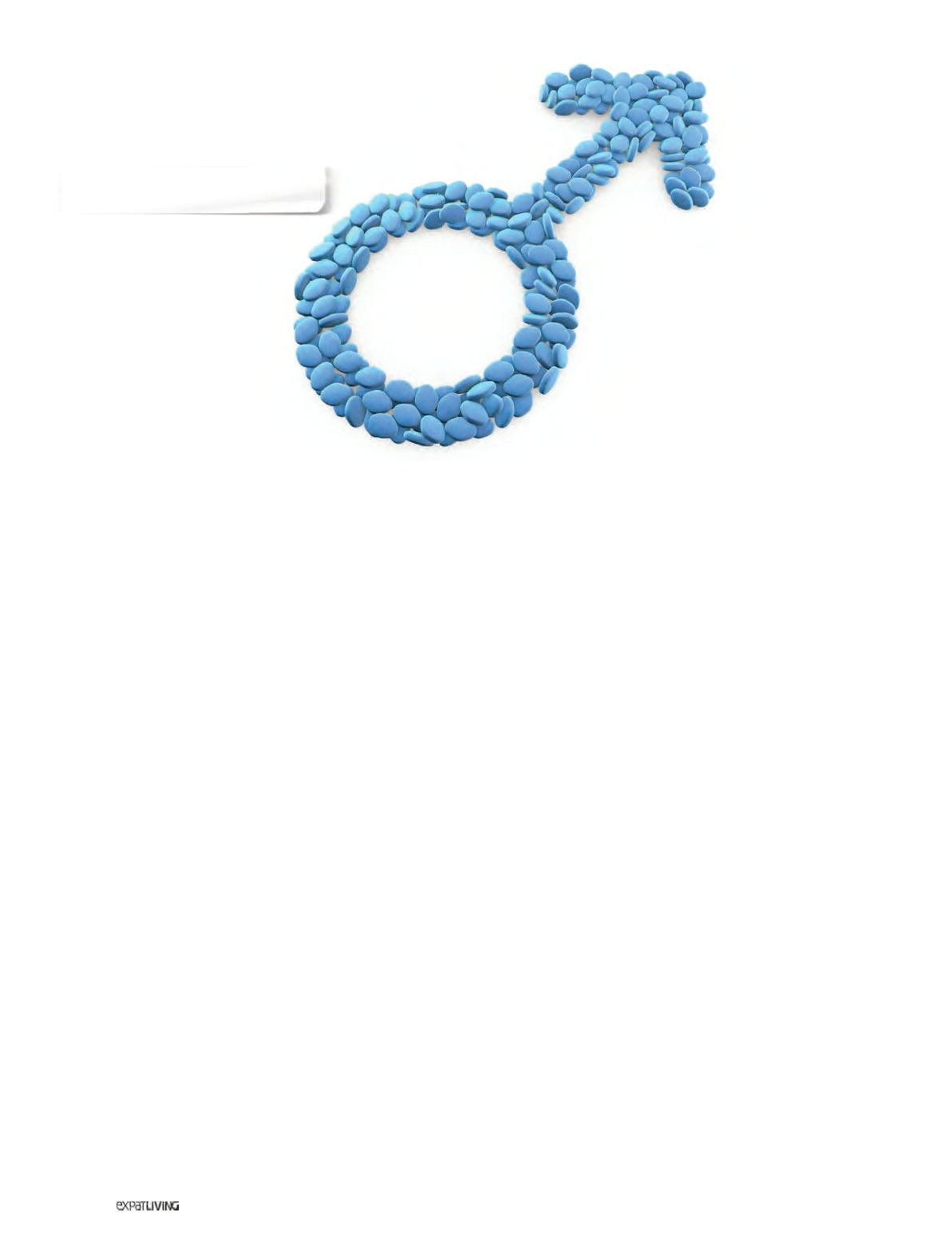

HEALTH&FITNESS
266
June15
#2 MAKING A STAND
According to urologist DR SIMON
CHONG, erectile dysfunction (ED)
can refer to various problems
with erection, such as having
an erection that is not hard
enough, losing an erection
before orgasm, and having no
erection at all. It can affect all
age groups, from young healthy
teenagers to elderly men. What’s
more, ED is not just about sex, he
says, and is often a reflection of one’s
underlying health.
He acknowledges that only a small percentage of
sufferers seek help. Two main reasons are, firstly, that some
men are embarrassed to talk about something so intimate; and
secondly, that they and their spouses accept the condition as
part of normal ageing and feel that treatment is unnecessary.
Is this the best attitude to take? It may not be. Even for
an older man, ED can be a red flag for conditions such as
diabetes and coronary arterial disease. That’s because the
penile artery is half the size of the coronary artery and a
quarter of the size of the internal carotid artery (the one in
the neck supplying blood to the brain); so any disease that
causes narrowing of the heart and neck blood vessels, can
similarly cause narrowing of the penile blood vessels. But,
being smaller, narrowing of the penile artery can manifest as
ED from two to five years before a heart attack or a stroke,
thus serving as a harbinger or warning of what may be ahead.
Culprits
The causes can be broadly placed into two groups, says Dr
Chong. The first is medical causes, which can be related to
poor blood supply, pelvic nerves that aren’t working properly,
low levels of testosterone hormone, and so on. The second is
psychological factors, such as depression, anxiety, insomnia,
work stress and relationship problems. These often overlap.
As one might expect, ED in younger men is more often due
to problems affecting their mind and their moods. In older
men, it’s more likely to be due to underlying health issues like
high cholesterol or diabetes. “Of course, the worry with not
getting a good erection can cause mental stress,” he adds,
“which can dampen a man’s confidence in bed.”
In his experience, there’s little difference between
nationalities, and mental stress is a common underlying issue.
“Busy couples can find it difficult to set aside enough time for
slow, stress-free intercourse that is enjoyable for both of them.”
Another important cause of ED is having a low testosterone
level, and that can affect a man’s libido, leading to difficulty
with arousal and disinterest in sex. “Besides ageing, other
factors such as stress, an unhealthy diet, a lack of exercise,
and excess body fat, can all contribute to low levels of
testosterone and diminished sex drive.”
Pills, Gels, Jabs… and More
Phosphodiesterase (PDE5) inhibitors,
such as
Viagra, Levitra and Cialis
,
are oral pills that all work in a similar
manner, explains Dr Chong. They
increase the levels of certain neuro-
chemicals that will lead to dilatation of
the penile blood vessels, thus bringing
more blood into the penis, resulting in a
fuller, harder erection.
These pills are usually taken on demand,
about an hour before sex. Viagra and Levitra may
not work well if taken with food. One common issue with
taking these pills on demand is the need to wait for the effect
to kick in, by which time the mood for intimacy may have
passed, leaving the couple feeling frustrated. Cialis also has a
lower dosage form that the man takes daily. This results in
a constant level of the drug within his system, and when
the mood is there and with sexual arousal, it will take effect
immediately.
Not all men respond well to the pills, however. For these
men, the next option is a penile injection of a drug which works
by a different pathway from one used by PDE5 inhibitors.
Though this may sound frightening, it is usually not painful
and it can work better than the pills.
The last resort, which Dr Chong says is guaranteed to work,
is undergoing
penile implant
surgery. A silicone prosthesis
is surgically inserted into the penis, under the skin so that
it is not visible externally. It comes in two forms – malleable
and inflatable. The
malleable
prosthesis can be bent and
tucked within the underwear to hide it, and then straightened
for intercourse. The
inflatable
prosthesis comes with a pump
hidden within the scrotum, which is used to inflate and deflate
the prosthesis inside the penis.
“As the prosthesis is a physical structure, having a good
and hard erection is always possible, for however long the
man requires it. What’s more, it does not affect urination
nor reduce the sensation and pleasure of sex. The man can
experience orgasm and can ejaculate just as he did before,”
says Dr Chong.
Finally, though it sounds a bit, well, shocking, there’s
something new to treat ED:
shock wave therapy
. Using a
machine that delivers low energy shock waves to the penile
organ, it works by promoting the growth of blood vessels
and smooth muscles, as well as by stimulating production
of the neuro-chemicals needed for erection. The treatment is
painless and is done in the privacy of the doctor’s consultation
room.
Each session takes about 15 to 20 minutes, and usually 12
sessions are recommended. To date, no complications have
been reported, and improvement can be expected within two
to three months.



















